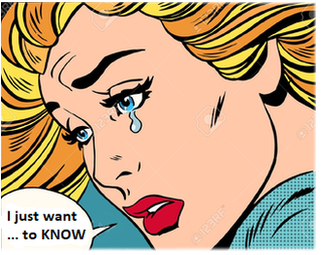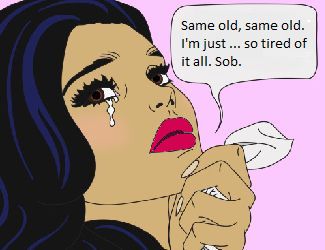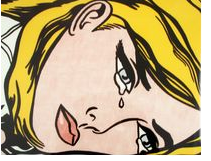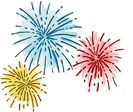 Sometimes we want answers to life's profound questions. Why am I here? What's my purpose?
Sometimes we want answers to life's profound questions. Why am I here? What's my purpose?
Sometimes we just want them for Book Club.
Here at LitLovers, we get a fair number of emails, asking for the answers to our Discussion Questions. Here's the latest :
Tim writes …
We talked about American War by Omar al Akkad in my book group the other day, using the discussion questions found on LitLovers. The group couldn't decide on the best answers to some, so I'm writing to see if you have any answers for them?
I'm sorry, Tim, we don't. Sometimes, the questions are issued by the publishers, as they are with American War; more often, at LITLOVERS we end up writing our own for a particular book. In either case, we don't have specific answers.
Confession: Sometimes we don't even have answers to our OWN questions.
It's anybody's take, really, because the questions are designed to be OPEN ENDED—to stimulate discussion. They're not meant to have a single right answer but to result in different possibilities.
Book clubs tell us that their best discussions are those with different viewpoints, each one as legitimate as the next. It's what makes conversations about books so rewarding: I say PO-TAY-TOE … you say PO-TAH-TOE.
Even authors acknowledge that readers bring different interpretations to a book that they'd never considered. That doesn't make those ideas—or readers—wrong.
On the contrary, new meanings—created through the act of reading, by individual readers—make literature all the richer. Luminaries like Peter Carey and Margaret Atwood, both Man Booker Prize winners (Peter Carey twice!), have told us as much.
So the point is … you DON'T (really) WANT answers to book club questions. That would ruin the fun.
 Read a book. Discuss the book. Read a book. Discuss the book. Read a bo … yeah, yeah.
Read a book. Discuss the book. Read a book. Discuss the book. Read a bo … yeah, yeah.
Monotous? Maybe. The other day I received an email asking for book ideas paired with activities surrounding cooking, music, and gardening …or anything else that might perk up the meeting.
We came up with a few ideas. If you've got any others, we'd love to hear.
1. Sourdough by Robin Sloan: discuss the book, then…
…bake sourdough loaves using live culture. Or bake the bread first… then discuss the book AFTER you pop the bread in the oven.
2. Lab Girl by Hope Jaren or
The Signature of All Things by Elizabeth Gilbert: discuss the book, then……set up a potting table with pots, potting soil, spades, etc., and have members plant individual tree saplings or some sort of outdoor plant (everyone could even name their plant for a favorite novel or character: Anatomy of a Miracle, H is for Hyacynth; The Secret Life of Violet Grant; Upstart Lizzie Bennet).
3. American Wolf by Nate Blakeslee: discuss the book then……watch a National Geographic wolf documentary on YouTube: She Wolf is good (the wolf featured in the film is the same female wolf ,"0-6," featured in the book); Living with Wolves: Jim and Jamie Dutcher is good, too.
4. Last Days of Night by Graham Moore: discuss the book, then……watch PBS's American Experience: Tesla or BBC's Nikola Tesla. OR...make an easy electric motor (see instructions on YouTube or... invite a physics teacher to demonstrate how one is made. They're so cool: my husband made one for me years and years ago!)
5. Bel Canto by Ann Patchet: discuss the book, then……listen to recordings, or watch videos, of Renee Flemming (on whom Patchet based her book; they're friends) OR...invite a singer/voice teacher to demonstrate operatic techniques: opera singers NEVER use mikes (unlike Broadway singers) yet even their softest notes can be heard in a 2,500 seat concert hall—an astonishing feat requiring years of study.
6. The Little Paris Bookshop by Nina George: discuss the book, then……set up a one-night "bookshop": members bring anywhere from, say, 3 to 5 books to exchange with others OR consider setting up a "Little Free Library" somewhere OR, like Monsieur Perdu, have members bring one book and talk about how that particular book helped them cope with a difficult problem or period in their lives.
 We get lots of mail asking for Discussion Questions for mysteries, and there've been a lot of them lately—emails AND new crime novels (all claiming to be the "new" Gone Girl).
We get lots of mail asking for Discussion Questions for mysteries, and there've been a lot of them lately—emails AND new crime novels (all claiming to be the "new" Gone Girl).
Sadly, for book clubs, authors or publishers don't often issue questions for mysteries—for a couple of reasons:
♦ Specific questions tend to give away the plot, ruining the element of surprise. Remember, mysteries depend on withholding information.
♦ Bestselling crime novels aren't considered "book club" material. They're all about plot and don't necessarily open themselves up to discussions about character dynamics or weighty social issues. Major serial authors like James Patterson, Michael Connelly, J.D. Robb, David Baldacci write for different reasons and audiences.
So we've got our own questions below. Feel free to use them or access them here.
Questions for Mystery - Crime - Suspense - Thrillers
1. Talk about the characters, both good and bad. Describe their personalities and motivations. Are they fully developed and emotionally complex? Or are they flat, one-dimensional heroes and villains?
2. What do you know...and when do you know it? At what point in the book do you begin to piece together what happened?
3. Good crime writers embed hidden clues, slipping them in casually, almost in passing. Did you pick them out, or were you...clueless? Once you've finished the book, go back to locate the clues hidden in plain sight. How skillful was the author in burying them?
4. Good crime writers also tease us with red-herrings—false clues—to purposely lead us astray? Does your author try to throw you off track? If so, were you tripped up?
5. Talk about the twists & turns—those surprising plot developments that throw everything you think you've figured out into disarray.a. Do they enhance the story, add complexity, and build suspense?
b. Are they plausible or implausible?
c. Do they feel forced and gratuitous—inserted merely to extend the story?
6. Does the author ratchet up the suspense? Did you find yourself anxious—quickly turning pages to learn what happened? A what point does the suspense start to build? Where does it climax...then perhaps start rising again?
7. A good ending is essential in any mystery or crime thriller: it should ease up on tension, answer questions, and tidy up loose ends. Does the ending accomplish those goals?a. Is the conclusion probable or believable?
b. Is it organic, growing out of clues previously laid out by the author (see Question 3)?
c. Or does the ending come out of the blue, feeling forced or tacked-on?
d. Perhaps it's too predictable.
e. Can you envision a different or better ending?
8. Point to passages in the book—ideas, descriptions, or dialogue—that you found interesting or revealing, that somehow struck you. What, if anything, made you stop and think? Or maybe even laugh.
9. Overall, does the book satisfy? Does it live up to the standards of a good crime story or suspense thriller? Or does it somehow fall short?
10. Compare this book to other mystery, crime, or suspense thrillers that you've read. Consider other authors or other books in a the series by the same author.
(Questions by LitLovers. Please feel free to use them, online or off, with attribution. Thanks.)
 This just in: A Facebook friend wrote asking about the use of Kindles and other e-book devices in her book club.
This just in: A Facebook friend wrote asking about the use of Kindles and other e-book devices in her book club.
A good friend and I are starting a book club, and someone has asked if she can use her Kindle. Although I don't see a problem, my co-founder says, "Definitely not." What are your thoughts? Any advice would help.
The problem the friend has with Kindles, apparently, is her fear that e-readers are putting bookstores out of business. So a compromise was reached: use your Kindle at home, but just don't bring it to the book club.
Wanting to save bookstores is a laudable concern. But the club's solution—use your Kindle, just don't let us see you do it—is like closing your eyes against a tsunami: if you don't see it, maybe it's not happening.
Tough issues—preserving tradition vs. moving into the future. But both the future and technology are unstoppable—technology IS a tsunami ... and it WILL engulf everything in its path. One need only took to history: ♦ scroll → book ♦ buggy → auto ♦ movies → tv ♦ mailbox → inbox.
Still, there's room for books and e-readers. Scroll down to the blog post right below this one, BOOKSTORES MAY STICK AROUND AFTER ALL. The past five years it seems have seen real growth in their numbers.
So what do you think? Do your book club members use Kindles?

We got some guff from guys objecting to our tale of woe—the woman's book club who invited their husbands to join. Well, here's the other side—here's what happens when MARS opens its door to VENUS.
Book Club Calendar
 "First the RULES," the ladies tell us— NO T-shirts. NO cigars. :-( |
 50 Shades—whoa! Hot. Who knew? :-) |
NO BEER??? A nice Merlot...? What the hell's a Merlot? |
 YES! The Masters!! Whaddya mean we can't reschedule? Whyyyyyy? |
 Nicholas Sparks? Again? Are you KIDDING? |
 We go "as a club" to see The Help. It feels, eh…girly. |
A picnic. We wear T-shirts! We drink beer!! We are MEN!!! |
No sci-fi, no westerns, no spy thrillers. Not one work of history. |
Q: What's the difference between History and historical fiction? A: ROMANCE. |
| Breakthrough! What women call Romance, we call Soft Porn. High Five, guys! |
Our 4th book on Tudor England. Shoulda seen it coming. |
Christmas party: $150/couple plus $35 gift. That's it, we're outta here. |
 |
 Superbowl—yes. Tudors—no. Sparks—never. Who's got beer? |
 |
